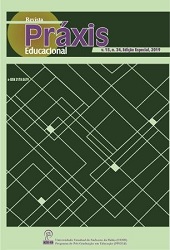PRESUPUESTOS HISTÓRICOS Y POLÍTICOS DE LA EDUCACIÓN DE JÓVENES Y ADULTOS
DOI:
https://doi.org/10.22481/praxisedu.v15i34.5624Palabras clave:
Educación de Jóvenes y Adultos, Historia, Políticas EducacionalesResumen
El artículo presenta los presupuestos históricos y políticos de la Educación de Jóvenes y Adultos en Brasil. Se trata de los resultados de una pesquisa en la cual se abordó un análisis crítico y documental acerca de la política y gestión de esa modalidad de ensino en el país. Se realiza la comprensión de la historia de la EJA, a partir del período colonial hasta la actualidad a partir del contexto incesante de reformas educacionales. En seguida, se presentan las significativas políticas en los principales documentos legales y oficiales reguladores de la organización en esta modalidad. El analfabetismo y el retraso educacional en la población joven y adulta perduraron en la historia educacional del país y aún es un obstáculo que necesita ser solucionado. Se concluye que es necesario un planeamiento efetivo para la implantación de políticas educacionales direcionadas a la EJA, las cuales deben ser configuradas de manera coherente, como una política pública y, no solamente, en la forma de programas urgentes y temporários.
Descargas
Métricas
Descargas
Publicado
Cómo citar
Número
Sección
Licencia
Usted es libre de:
Compartir — copiar y redistribuir el material en cualquier medio o formato; Adaptar — remezclar, transformar y construir a partir del material para cualquier propósito, incluso comercialmente. Esta licencia es aceptable para Obras Culturales Libres. La licenciante no puede revocar estas libertades en tanto usted siga los términos de la licencia.
Bajo los siguientes términos:
Atribución — Usted debe dar crédito de manera adecuada, brindar un enlace a la licencia, e indicar si se han realizado cambios. Puede hacerlo en cualquier forma razonable, pero no de forma tal que sugiera que usted o su uso tienen el apoyo de la licenciante.
No hay restricciones adicionales — No puede aplicar términos legales ni medidas tecnológicas que restrinjan legalmente a otras a hacer cualquier uso permitido por la licencia.










